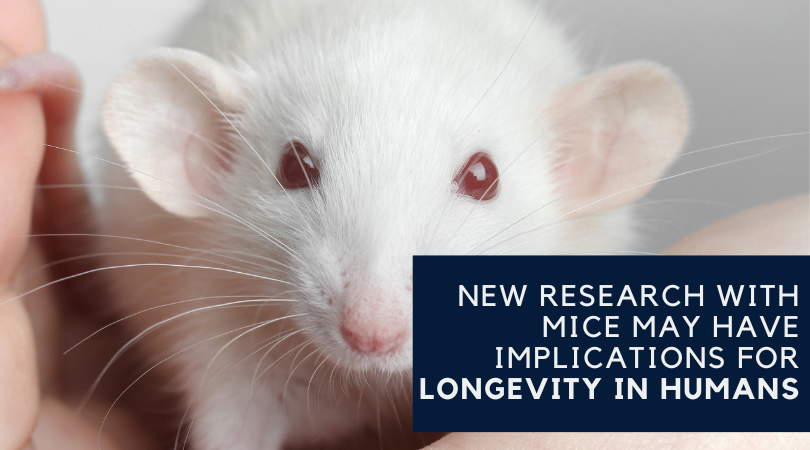New Research with Mice May Have Implications for Longevity in Humans
Posted on
Longer life is the Holy Grail of scientific research, and new discoveries may put us one step closer to understanding how to help mice, and humans, live longer.
Putting the Brakes on Growth Hormone
Researchers at Ohio University Heritage College of Osteopathic Medicine and Edison Biotechnology Institute have discovered a way to extend lifespan in mice—stopping the activity of growth hormone (GH) in fat cells.

The inspiration for the study was a single mouse, who set a record for being the oldest living laboratory mouse. The mouse was a growth hormone receptor knockout (GHRKO) mouse—one of a line of mice developed at Ohio University that has been used for more than 25 years to study the aging process. GHRKO mice, which are bred to have no GH action anywhere in their bodies, live longer, have enhanced insulin sensitivity, and are protected from several age-related diseases.
Researchers decided to selectively remove growth hormone receptor (GHR) genes from fat cells rather than the entire body of the mouse, to see if they could keep the extended lifespan while losing the less desirable effects, such as obesity and smaller size. It worked, at least for male mice. Removing GHR from fat cells led to improved insulin sensitivity and increased lifespan in male mice. Female mice saw less of an effect from GHR disruption.
The study’s finding that the removal of GH action results in health benefits and longer life could lead to a better understanding of how growth hormone works in humans.
The Benjamin Button Effect
Scientists at Harvard Medical School have been able to reverse the aging process in mice using proteins that can transform an adult cell into a stem cell.
By converting these cells, researchers essentially “reset” aging cells into younger versions of themselves, which results in improved cognitive ability, eyesight, and various other conditions that tend to deteriorate with age.
According to the team, the cell reset appears to be permanent, with the normal aging process starting again from the new cell “age.”
The method has been successful in cells in the muscles and brains of mice, and is now being tried in the entire body. Researchers think it could work in humans as well.
Longevity in Mice is Controlled by Different Genes for Males & Females
Is how long you live determined by genetics? A new study from a group of researchers at the University of Tennessee and the Swiss Federal Institute of Technology in Lausanne seems to indicate that the answer is yes, but the specific genes that control the aging mechanism are different in female mice versus male mice.
Some genes work to lessen the risk of certain potentially life-shortening diseases, but in the new study, researchers were looking for a more clear-cut connection—genes that directly control longevity.
The study was conducted through the National Institute on Aging (NIA)-funded Interventions Testing Program, which was created to determine if dietary changes could increase lifespan in mice.
The program used three testing sites—The University of Texas Health Science Center at San Antonio, The University of Michigan at Ann Arbor, and The Jackson Laboratory in Bar Harbor, Maine—and an unusually large number of mice. With a sample size of several thousand mice, which were specifically bred to mimic human genetic diversity, it is one of the largest studies that has attempted to identify genes influencing lifespan.
The study yielded evidence that genes directly control how long mice live, with an important distinction. The genes associated with long life in female mice are different than the genes associated with long life in male mice. In the study, some candidate genes lengthened the lifespan of female mice, while others did the same for male mice but had no effect on female mice. Researchers did find one gene cluster that increased longevity in both male and female mice.
The team then examined human genome biobanks to look for the same effect and found genes that seemed to correspond to the life-extending mouse genes. Next, they took the genes associated with longer life in both male and female mice and tested their longevity effect in worms (Caenabordis elegans). They found that the identified genes gave the worms longer life.
While the identification of lifespan-affecting genes in mice is just a starting point, and longevity in humans is due at least in part to non-genetic factors such as diet and lifestyle habits, the discovery could eventually be one more tool to help humans live longer, healthier lives.